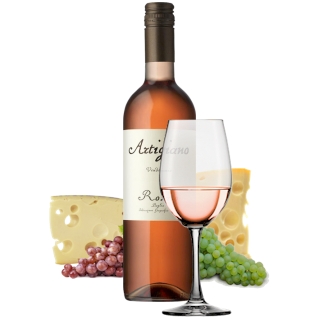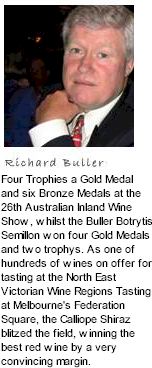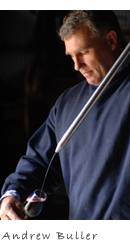


The Rutherglen winegrowing region was then, as it is now, famous for its fortified wines, Muscats, and full bodied red wines. Reginald Buller called his vineyard Calliope after the British warship. Producing delicious luscious wines and gutsy, full-bodied reds, the backbone of this vineyard is Rutherglen Shiraz. Old Shiraz vines at Calliope are not irrigated so yields are low at about one tonne to the acre. Consequently the fruit from this vineyard produces intensely flavoured wines, but in rather small quantities, that Andrew Buller crafts into wines of great depth and elegance. There are also small plantings of some of the rarer varieties including Mondeuse and Cinsaut.

Principal red varieties grown are Shiraz and Grenache. There are also small plantings of the rare Mondeuse and Cinsaut, which are used to make the table wines. Fortified wines come from Muscat, Frontignac and Tokay (Muscadelle). Andrew Buller also has a second vineyard in the Rutherglen region at Indigo Valley, an elevated site east of Calliope. The grapes used to make the Rutherglen wines are hand picked, processed in open fermenters and generally handled using traditional methods that have not changed since the winery was first built. The wines are individualistic with a strong regional flavour.
After establishing Calliope in Rutherglen, and having weathered the storms of the Great Depression and the Second World War (during which he again served in the R.A.N.) Reginald Buller, joined by his son Richard, decided in 1951 to expand the operation. The site selected was at Beverford near Swan Hill in North West Victoria and Reginald purchased land there, establishing a new vineyard, winery and distillery. Beverford is a sleepy hamlet on the Murray Valley Highway in Northern Victoria, and enjoys the added security of irrigation - an insurance against the dry years.
Beverford is blessed with a sunny climate, good soils and ample water, the Swan Hill Winegrowing Region, as it turned out, was the ideal spot for vines. The district produces a wide range of fruits including citrus, stone fruits, dried fruit, table and wine grapes. The climate and soils of Beverford provide a favourable environment for growing wine grapes. Abundant sunshine and ample water ensure viable crops. The critical autumn ripening period is normally dry, allowing the grapes to come to the winery in good condition and free of disease.

Having access to grapes from two different areas also allowed for the production of a wider range of wines. While Beverford was being established, Richard, supported by his wife Val, further developed Rutherglen. In 1966 Bullers for the first time produced wines under their own label. Previously all the wine had been sold in bulk to retailers and merchants.
With the progressive addition of stainless steel storage tanks, modern equipment and refrigeration, the Buller production has grown significantly over the years. As well as grapes from the estate vineyards, fruit from good growers throughout the region is processed, some of whom have been supplying Buller for three generations. The Buller Estate also has its own 17ha Magee vineyard and 11ha Athorn vineyard.
It can be hard work running a family business, but brothers in wine Rick and Andrew Buller would have it no other way. Rick oversees management of the Beverford winery while Andrew is winemaker / manager of the Calliope vineyards and Rutherglen winery. Both brothers opted for a hands on approach to learning their craft, albeit following different paths. Andrew has worked vintages in regions as diverse as Gisborne, the Clare Valley, Portugal and Beaujolais, and shows particular skill in fortified and table wines. He won a gold medal at the Rutherglen Wine Show for his first vintage port in 1981 and makes the iconic Rutherglen Shiraz, Calliope. Rick is a board member of the Victorian Wine Industry Association, treasurer of the Swan Hill Food & Wine Society, and a member of Swan Hill Inc.
